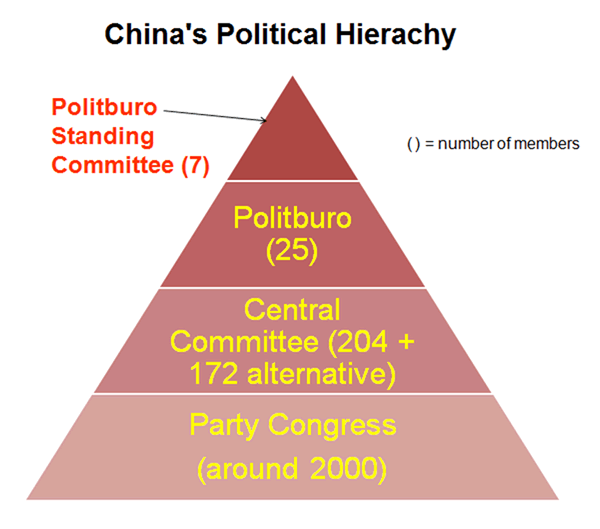The 19th National Congress of the Chinese Communist Party culminated with the announcement of the new Politburo Standing Committee (PSC) – the group of officials leading the country in the coming five year. Five out of seven members of the previous PSC were replaced, with only President Xi Jinping and Premier Li Keqiang staying in power. The five new members are Li Zhanshu, Wang Yang, Wang Huning, Zhao Leji and Han Zheng. As we mentioned in the previous report, Li Zhanshu, Zhao Leji, Wang Huning and Chen Min’er have very strong link with President Xi. We are surprised that Chen is not chosen to be the core team. Derailing from the usual practice that has been in place since 1990s, Xi refrained from revealing who his successor is. This suggests that he refuses to step down after the coming 5-year term.

Previous PSC
| Rank | Name | Year of Birth | Position |
| 1 | Xi Jinping | 1953 | General Secretary |
| 2 | Li Keqiang | 1955 | Premier |
| 3 | Zhang Dejiang | 1946 | Chairman of the Standing Committee of the National People’s Congress (NPC) |
| 4 | Yu Zhengsheng | 1945 | Chairman of the Chinese People’s Political Consultative Conference (CPPCC) |
| 5 | Liu Yunshan | 1947 | The first-ranked Secretary of the Secretariat, President of the Central Party School |
| 6 | Wang Qishan | 1948 | Secretary of the Central Commission for Discipline Inspection |
| 7 | Zhang Gaoli | 1946 | The first-ranked Vice Premier |
New PSC
| Rank | Name | Year of Birth | Position |
| 1 | Xi jinping | 1953 | General Secretary |
| 2 | Li Keqiang | 1955 | |
| 3 | Li Zhanshu | 1950 | |
| 4 | Wang Yang | 1955 | |
| 5 | Wang Huning | 1955 | The first-ranked Secretary of the Secretariat |
| 6 | Zhao Leji | 1957 | Secretary of the Central Commission for Discipline Inspection |
| 7 | Han Zheng | 1954 |
Other evidence that Xi has used this twice-in-a-decade congress to enormously upgrade his status and authority is the inclusion of "Xi’s thought on Socialism with Chinese characteristic for a new era" in CCP’s constitution. The act has made Xi the most powerful leader after Mao Zedong, even surpassing Deng Xiaoping. While names of both Mao and Deng are enshrined in the constitution, Xi is the only person, besides Mao, whose name is printed in the document before death.
While receiving limited media coverage, the head of the NDRC at the Congress affirmed that China was on track to achieve its 2017 growth target of 6.5%. We believe this affirmation intends to ease market concerns over potential growth slowdown in 2H17, amidst decline in productivity growth as the government curtail heavy industry, such as coal, steel and aluminum production, and construction to reduce pollution, as well as slowdown in housing price growth. With GDP growth at +6.9% in 1H17 and +6.8% in 3Q17, we also expect Chinese full year growth would meet target this year.
Notwithstanding leadership reshuffle, the economic policy would stay unchanged. Indeed, the National Congress is for clarification of CCP’s ideology and leadership reshuffle, rather than setting of economic policies. The key aspects of the monetary and fiscal policies have already been lain down at the National Financial Work Conference in July. Meanwhile, any new economic target or related policy should be revealed at the Economic Working Conference usually scheduled in December.
